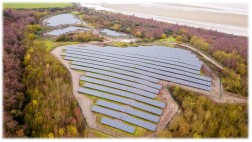Climate Change Newsletter Edition 3
How do solar panels work?
Solar panels work by converting energy from the sun into power. Light shines through the layers of semi conducting material which creates a flow of electricity. Solar panels can generate electricity even on cloudy days as long as there is some level of sunlight. The amount of energy produced is dependent on how direct the sunlight is, quality, size and location.

Why are we investing in solar panel sites?
There is a need to move our energy provision away from generation through burning fossil fuels. Solar panels are a renewable source of energy, which means they are natural sources which cannot be depleted as quickly as being consumed. By investing in solar farms we can directly benefit from the energy generated or contribute towards decarbonising the electricity grid. Welsh Government set an aim for Wales to meet 100% electricity needs from renewable sources by 2035 and you can read more about this here Climate Change Bulletin.

Where are Flintshire County Council’s solar farms?
We currently have 4 solar farm sites located in Flintshire capable of generating around 4MW of electricity. We have two in Buckley which have been in use since 2016, and two new solar farms in Flint and Connah’s Quay. Both Flint and Connah’s Quay sites have biodiversity plans for wildflower meadow seeding and smaller species of birds will still be able to utilise the land for ground nesting and foraging.
Future Developments.
We are carrying out feasibility on future sites for solar, wind and hydro power, and will utilise multi-land methods where possible including agrivoltaics, while linking in with our biodiversity commitments.
In the coming weeks!
What is Earth day and why is it important?
Earth day is an annual celebration that honours the achievements of the environmental movement and raises awareness of the need to protect the earth and its natural resources. It takes place this year on the 22nd April.
This year’s theme is to invest in our planet, which is highlighting the importance of putting our time and energy into fighting climate change.
Ways to invest in our planet:
If you want any more ways to invest in our planet go to our climate change page or Earth Day Tips.
Help Keep Flintshire Tidy
Keep Wales Tidy manage two litter picking hubs within Flintshire located in Wepre Park and Greenfield Valley. These hubs store equipment you can use for your litter picking. There are litter pickers, Hi-Vis vests, rubbish bags and hoops. You can join a planned event or visit the visitor centre to pick up the equipment for your litter pick and then return it to the centre afterwards.
There are 184 hubs located across Wales. Why not invite a friend and walk around your local area to collect some litter?
Litter Champion scheme
You can become a litter champion by actively volunteering to pick up litter and reduce waste. You can do this by visiting your local litter picking hub or contact your own local project officer.
Litter free zones
Businesses of all shapes and sizes can adopt specific zones to clean up on a regular basis. This includes schools which is a great way to encourage a positive relationship between our young people and litter.
Great British Spring Clean -https://www.keepbritaintidy.org/get-involved/support-our-campaigns/great-british-spring-clean
Why not use the local litter picking hubs in the area to get involved in the Great British Spring Clean which is running from the 17th March up until the 2nd April.
Did you know?
Where does your brown bin waste go?
Flintshire County Council collect your brown bin waste from kerbside where it is taken to the Household Recycling Centre in Greenfield. 12,000 tons of green waste from household, recycling centres, roadsides, parks and gardens is processed into compost on the site. This short video explains the process. The final product is available free for residents for collection from Household Recycling Centres throughout the year.

Benefits of using soil conditioner / compost.
Soil conditioner / compost improves soil moisture and nutrient retention, while also storing the nutrients more easily. The soil conditioner also aids in drainage by restoring structure to the soil. Due to this, healthier plants are grown, allowing them to combat disease and pests better, while growing bigger and stronger. The final benefit is being able to turn what was once waste, into a product, which is great for the environment.
Garden waste collection service 2023.
The brown bin waste collection service runs from 1st March 2023 until 16th December 2023. To find out more about the subscription for this year’s garden waste collection service visit our latest news section.